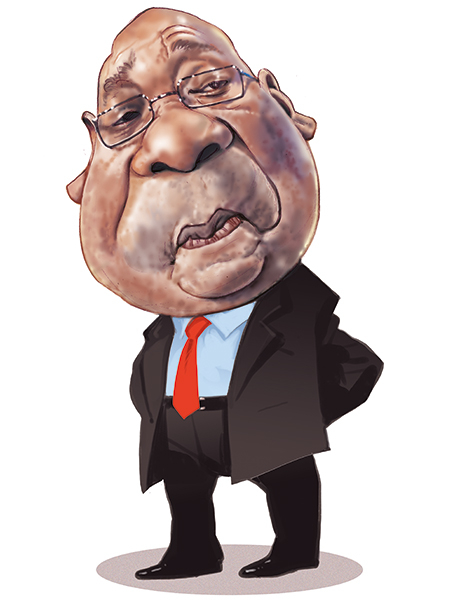JOHANNESBURG: South Africans awoke to a nation without Jacob Zuma as president for the first time in nine years on Thursday, after the scandal-plagued head of state reluctantly resigned on orders from the ruling African National Congress (ANC).
South Africa’s parliament will elect Cyril Ramaphosa as the country’s new president on Thursday, the ruling ANC party said, after Jacob Zuma resigned in a late-night television address.
The African National Congress (ANC), which has a large majority in parliament, said it would nominate Ramaphosa, a wealthy former businessman, “to be elected as the new President of the Republic of South Africa”.
After being voted in, Ramaphosa will address lawmakers gathered in the parliament in Cape Town, the party said in a statement.
Zuma resigned on Wednesday as the ANC finally turned against him after a nine-year reign dominated by corruption scandals, economic slowdown and plummeting electoral popularity.
Zuma railed against the ANC for “recalling” him from office and — when he at first refused to resign — then threatening to oust him via a parliament no-confidence vote.
In an earlier TV interview on Wednesday, said he had received “very unfair” treatment from the party that he joined in 1959 and in which he had fought for decades against apartheid white-minority rule.
Zuma had been in a power struggle with Ramaphosa, his deputy president since in 2014.
Zuma’s hold over the ANC was broken in December when his chosen successor — his former wife Nkosazana Dlamini-Zuma — narrowly lost to Ramaphosa in a vote for the new party leader.
Parliament is expected to meet from 1200 GMT.
The road back to prosperity and self-respect under Ramaphosa, who became ANC head in December, will be long and hard in a nation divided by race and inequality.
But Zuma’s departure offers evidence of the strength of South Africa’s institutions, from the courts to the media and the constitution. He resigned as president late on Wednesday after nine years in office.
The 75-year-old said in a 30-minute farewell address to the nation he disagreed with the way the ANC had pushed him towards an early exit after Ramaphosa replaced him as party president, but would accept its orders.
“Defiant in defeat” and “Going, Going, Gone” were some of the newspaper headlines that captured Zuma’s reluctance to leave.
“South Africa’s long nightmare is over,” read the headline of an analysis on online news site Daily Maverick.
The foundation set up to guard the legacy of the late anti-apartheid icon Nelson Mandela said on Thursday Zuma’s resignation brought to an end “a painful era for the country.” The ANC hailed Zuma’s decision to resign.
Ramaphosa is due to be chosen by lawmakers as permanent president later in the day, a role he will fill until elections next year.
His appointment appears certain as the ANC holds a majority in parliament, though lawmakers will hold a secret ballot if he is not the sole candidate.
“The office of the chief justice has made itself available today to officiate in the business of electing a new president,” Mthembu told a parliamentary committee meeting.
Speaker of parliament Baleke Mbete said an official letter of resignation from Zuma was “still on its way”.
Ramaphosa’s first state of the nation address was expected to take place on Friday. The speech had been scheduled to be delivered by Zuma last Thursday, but was postponed after pressure mounted for him to resign.
The rand currency, which has gained ground whenever Zuma hit political turbulence, soared to a near three-year high against the dollar on Zuma’s resignation.
“One chapter in South Africa’s political soap-opera has finally ended with the resignation last night of President Jacob Zuma,” NKC African Economics analysts wrote in a note.
“It would be gratifying to see the dedication and purpose the ANC put into ridding itself of Zuma now be directed into rebuilding the economy, dealing with the corruption still residing in the ANC and improving its shoddy governance record.” Zuma’s resignation came just hours after police raided the luxury home of the Gupta family, Indian-born billionaire allies of the former president who have been at the centre of corruption allegations against Zuma and his circle for years.
Zuma and the Guptas have always denied wrongdoing.
Police said on Wednesday three people were arrested during the raids on various properties in Johannesburg.
State broadcaster SABC said a Gupta family member was among those detained, while a senior judicial source said police were expected to arrest up to seven more people and that Gupta family members would be among them.
Police said the raid was in connection with a state-funded dairy farm, which prosecutors last month called a “scheme designed to defraud and steal”.
The suspects were expected to appear in court on Thursday.













